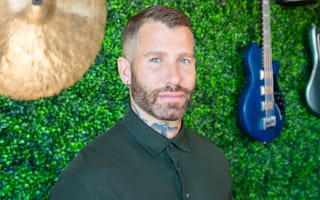Earlier this year, Bradford Shellhammer took to the stage alongside his colleagues at Reverb’s company-wide party, Summer Jam. Fresh into his then-new appointment as the music gear marketplace’s chief product officer, Shellhammer had the chance to flex his musical skills in front of over 200 excited team members.
For Shellhammer, the opportunity represented more than just belting out some tunes.
“Everyone went out of their way to be like, ‘What would you like to sing?’” Shellhammer said. “It showed me that Reverb was this inclusive place where people want to have a good time and share experiences.”
The time on the stage was also emblematic of Reverb’s culture as a whole.
“That moment was symbolic for me, because I felt included and accepted in the early days,” Shellhammer added. “That’s something that some people struggle with for years, if not decades at their jobs — and it happened to me in the first couple of days.”

The scene parallels the ethos Shellhammer channels into his work. Inclusion is dear to him — not just in how he builds his teams, but in how he approaches product. Shortly after joining Reverb from eBay earlier this summer, Shellhammer embarked on what he called an “abbreviated listening tour”: Asking questions from a wide-swath of team members to gather perspectives to inform the way forward for product development. And in the day-to-day work itself — just like how a balanced musical act is the byproduct of different solo talents — he seeks to include a broad cross-section of teams and departments in the work.
“When you say everyone’s invited into the team's process, sometimes that means you have to explain yourself 100 more times, and you have to build consensus and relationships,” Shellhammer said. “But ultimately, I think that it creates a better strategy, vision and product. It’s worth the time and effort upfront to create those bonds and those levels of trust.”
Shellhammer’s C.V. is deep: Aside from logging more than half a decade across various senior-level roles at eBay, and holding other roles like chief design officer at Backcountry.com, Shellhammer’s entrepreneurial credentials include co-founding Queerty, Fab.com and Bezar. And according to Shellhammer, it’s the startup days that partly inform his all-voices-welcome philosophy at Reverb, which provides a platform for music enthusiasts to acquire gear.
“I think my whole style of being inclusive and not defined by organizational boundaries or structure comes from when I started my career in the entrepreneurial space, not the corporate space. Because in that world, you don’t have the luxury of having grand organizations where you say, ‘This is what I do, and this is what you do.’ By default, my natural inclination is to ask questions about everybody’s work. I’m a former founder, I’m a former CEO. This is what I do. I want to understand everything,” Shellhammer said.
In joining Reverb, Shellhammer is turning music, his biggest hobby, into his profession: “Music has always been my number-one love. I intuitively know how enthusiastic and passionate musicians are.”
Shellhammer identified an opportunity to complement what he describes as a buying side-focused career experience with exposure to the selling and payments component of e-commerce, at a company whose size is at a sweet spot. At Reverb, goals include bringing more “personalization” to the platform, which he said the team has made a “big pillar of our strategy over the next couple of years.”
“Everyone at Reverb aligns with the ethos that the company looks like on the outside, which is about a passion for music and music gear. It’s the perfect marriage of the two worlds that I've inhabited during my professional career: It's small enough to still feel scrappy and like a startup, but it's moved on and scaled to a point where it's a thoughtful, sophisticated business. That’s been the most rewarding part so far in these early days: We move fast! The velocity from concept and idea to actually delivering new experiences for our customers, and learning their reactions to it, is just so quick.” Shellhammer said.
In a conversation with Built In, Shellhammer outlined what brought him to the Chicago-headquartered company, how his background informs his work and what’s ahead for product at Reverb.
What drew you to Reverb?
Bradford Shellhammer, Chief Product Officer: I wanted to do something that's speaking to a specific customer in a very passionate way, because that’s what I’ve dedicated my life to. I am an entrepreneur three times over. My entrepreneurial success story has everything to do with finding folks that had a specific passion and aesthetic, and communities that aren’t served by the big box marketplaces and retailers.
And with everything I’ve done post my entrepreneurial experience — whether it’s eBay, where we focused on a bunch of different enthusiast categories, or BackCountry, which is an outdoor enthusiast retailer — I knew that I wanted to be around passionate people who were in love with the customer, the customer problems and the things that populated the experience. Music has always been my number one love. I intuitively know how enthusiastic and passionate musicians are. Reverb was a great place to get out of my comfort zone and learn some stuff that I haven't been exposed to and be around a passionate, opinionated consumer base from whom I can also learn how to serve and build things in their name.
I knew that I wanted to be around passionate people who were in love with the customer, the customer problems and the things that populated the experience.”
What were your goals upon coming aboard?
Shellhammer: The first thing I wanted to do is just listen. I really wanted to take the time to understand what the team has done, what’s worked and what’s not worked. Number two, I wanted to make sure that the Reverb product strategy was best suited to today’s market, and the current needs of both buyers and sellers.
After the very abbreviated listening tour, I have been rolling up my sleeves with the team — and when I say “the team,” I mean everybody: the executive team, the marketing team, our sales and outreach team, our customer service team. I’ve included them and invited them into the product development process, which is a little bit of a new thing for Reverb.
It's something I learned at big companies at scale. When a product development team delivers stuff, and it's supported by a customer service team that knows what's coming and how to respond to customers; and you have a marketing team that's go-to-market strategy and vision is layered on top of a product strategy and vision, and you’re all focused on the same customer in a meaningful way, you get way more than the sum of those individual parts.
That’s what I’ve been doing with the teams right now: Being inclusive into our process of how we build product. We’re empowering a lot of different teams and people from separate parts of the company to author strategy that will lead into what we build, what we do, what we say and what we stand for.

What are some big themes you’ve heard from that listening tour?
Shellhammer: We’re bringing together the people who are talking on the phones with our buyers and sellers together, the people who are trying to advertise to the music-makers that utilize our platform, and the people who are trying to build the creative we put out into the world and discussing the different challenges they face. When you do that, you start to build empathy for the problems buyers and sellers on our marketplace might have that maybe you didn’t see or know during the product development cycle. It often leads to an expanded view of those interacting on our marketplace and what are all the pieces of the organization that serve them.
It’s not just product development and engineering; it’s often a combination of myriad teams and work. Having those teams at least be heard in the intake part of the product development lifecycle is critical, because it provides a much more nuanced 360-degree approach and view of what you could and should be doing. We’re not just a technology company that has the luxury of building products in a silo. We have to think of it on a grander scale and have all those inputs influence what we do and build.
We’re not just a technology company that has the luxury of building products in a silo. We have to think of it on a grander scale and have all those inputs influence what we do and build.”
How do you pull on your entrepreneurial experience at Reverb?
Shellhammer: It’s challenging the norm and not believing there’s a structure that you have to follow to get stuff done and to make an influence, but at the same time, understanding that people’s livelihoods and their happiness sometimes is wrapped up in what they do and how they do it. People want to be challenged and they want new ways of working — they just don't want it from someone who's disruptive. They want it from someone who is respectful. I try to balance that line a lot. Those lessons were very much learned in my early days of entrepreneurship.
Also, if you're going to be an entrepreneur and you're going to be a founder, you need to sell a vision. You need to really do the hard work of creating a strategic vision and a business plan. You have to be good at storytelling and you have to back it up with real data and have to back it up with real conviction. Product development is about listening to customers and building things in their name — rinse and repeat. It's that strategic thinking of how that process fits into something bigger and how it all adds up; that’s where the real unlock happens.
Looking ahead, what’s on your product roadmaps that excites you?
Shellhammer: I’m super passionate about making our marketplace much more efficient. We have to make it easy for buyers and sellers to find one another over the perfect instrument. Also, you will see a more personalized Reverb starting to emerge. Lastly, we’re really going to double down on the experience of our native apps. We have consumers who open our app so many times a day, and we need to build stickier, more inspirational experiences for them. I think you’ll see, sooner than later, a change in our native experiences, both Android and iOS.
What would you tell someone interested in joining the product team at Reverb?
Shellhammer: Musicians just have a different energy than a typical corporate culture! I’m building a team that's super diverse. I’m covered in tattoos. I’m literally a fashion designer who found technology as a career. I’ve followed an unconventional path to get where I am, and now I’m running a product and design team that is also very diverse in experiences — and we build things for an equally diverse customer base each and every day. So by design, my organization has to be one that has unique and complementary talents to speak to the buyers and sellers on our platform authentically. I’m very thoughtful in how I go about and approach this. When recruiting, I mostly search for candidates who are hungry and have that entrepreneurial spirit. I want to build a team that’s diverse in myriad ways — including gender, race and professional diversity.








